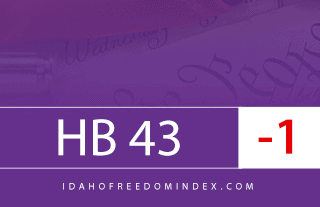


Bill Description: This bill makes families of children with serious emotional disturbance eligible for medical assistance coverage through the Department of Health and Welfare.
Rating: -1
Analyst’s Note: This bill stems from an implementation plan developed last year for the settlement of the 1980 Jeff D. class action lawsuit. A child referred to as Jeff D. and other children with serious emotional disturbance sued the state contending they were denied treatment. The settlement is designed to provide a new level of community support, health support, and social services for these children, altering the landscape of Idaho’s mental health services. This bill provides for greater reliance on federal Medicaid funding for this care.
Does it increase government redistribution of wealth? Examples include the use of tax policy or other incentives to reward specific interest groups, businesses, politicians, or government employees with special favors or perks; transfer payments; and hiring additional government employees. Conversely, does it decrease government redistribution of wealth?
Idaho Code 56-254 specifies who is eligible for payments for medical assistance. The statute adds to the list “children under eighteen (18) years with serious emotional disturbance, as defined in section 16-2403, Idaho Code, in families whose income does not exceed three hundred percent (300%) of the federal poverty guideline and who meet other eligibility standards in accordance with department rule.” Idaho Code 16-2403 defines serious emotional disturbance as “an emotional or behavioral disorder, or a neuropsychiatric condition which results in a serious disability, and which requires sustained treatment interventions, and causes the child’s functioning to be impaired in thought, perception, affect or behavior.” We think the proper way to help people in this category is through community and private sector assistance. This bill is an involuntary transfer of public wealth forced by the government on taxpayers. (-1)
Finally, although it has no bearing on this analysis, establishing program eligibility standards by rule is not the best way to set public policy. Eligibility standards for state assistance programs should be set by statute, not by rule.


